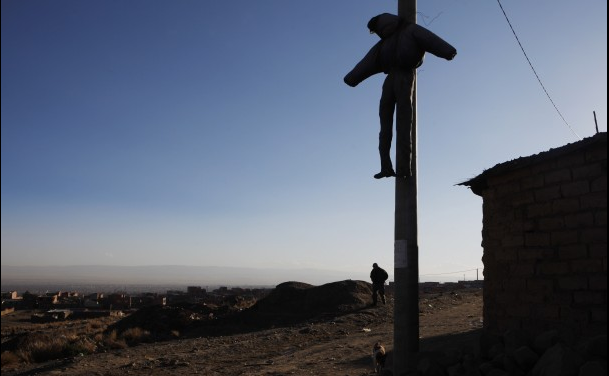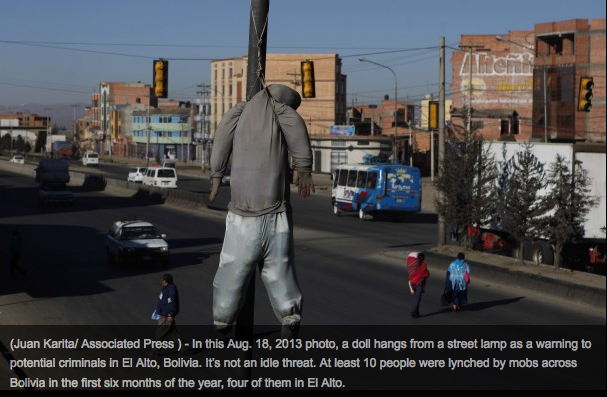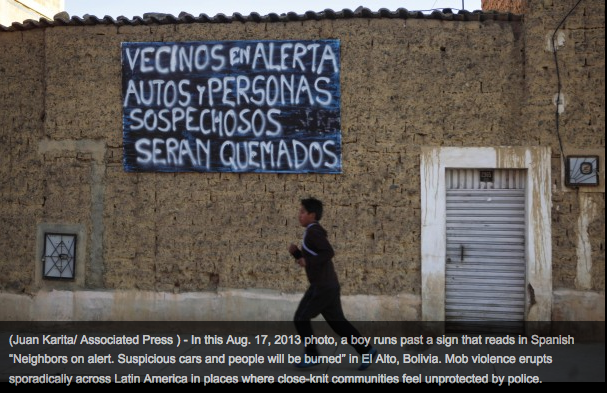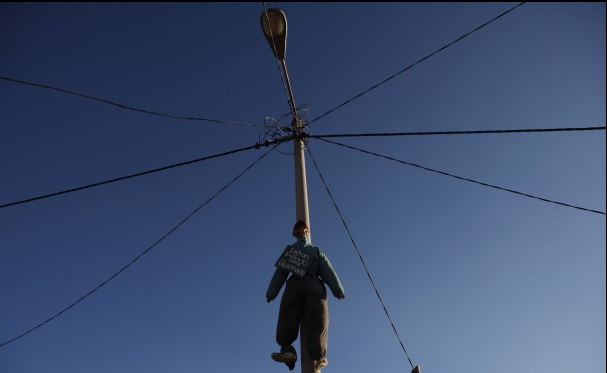
(above) (Juan Karita/ Associated Press ) - In this Aug. 17, 2013 photo, a doll hangs from a street lamp as a warning to potential criminals in El Alto, Bolivia. Mob violence erupts sporadically across Latin America in places where close-knit communities feel unprotected by police, while death dolls have become a common sight in an impoverished city plagued by crime.
Bolivians dangle 'death dolls' from power lines to warn thieves that lynching awaits
August 23, 2013 - Washington Post
By Associated Press, Published: August 23
EL ALTO, Bolivia — A sinister warning dangles above the burned-out hulk of a minibus in this sprawling sister city to Bolivia's capital: A faded effigy tied to a power line as if it had been hanged.
"Death dolls," made of old clothes stuffed with rags, have become a common sight in this impoverished city plagued by crime. They are often accompanied by hand-scrawled signs. "The thief who is caught will be burned," say many.
It's not an idle threat. At least 10 people were lynched by mobs across Bolivia in the first six months of the year, four of them in El Alto.

At least one was by error. In May, a drunken police sergeant in civilian clothing stumbled into a school, where the guard took him for a thief and alerted neighbors. The man was beaten, tied to a post and drenched with water as temperatures fell toward freezing. He was found the next morning, dead of hypothermia.
The burned-out bus was the result of another robbery attempt. Attackers who arrived in the bus managed to flee, but enraged neighbors burned it beneath a power line and hung the doll above it.
Hundreds hang from lampposts in El Alto, particularly its more precarious outlying districts, such as Villa Mercedes.
"The good thing is that the thieves feel fear when they see the dolls," said student Ivan Gonzalo Poma. "The bad thing is that the children see it. The lynchings are not good."
Street vendor German Honorio supports the use of the images to warn thieves, although he's not sure they heed the threat. "I don't know if they learn, but they are warned," he said. "It's the way we neighbors defend ourselves."

Mob violence erupts sporadically across Latin America in places where close-knit communities feel unprotected by police.
A mob in a Guatemalan village beat, shot and stabbed to death five men and a woman they suspected of robbery in September 2011, blocking roads to police. In December 2009, Guatemalan officials reported five vigilante killings in various incidents across the country in just three days. In 2000, villagers in Guatemala attacked a busload of Japanese tourists, killing one, when they confused the sightseers with child-stealers.
In Mexico this year, video of a mob beating and burning to death three men suspected of raping and killing a woman was discovered on sale in a street market in the southern state of Chiapas. A voice on the video said, "Gasoline on everything!" as the beaten suspects lay on the ground. Then the tape showed a man in flames, tied to a tree, writhing as he apparently burns.
El Alto was recognized as a city less than 30 years ago, and with some 850,000 people it has already surpassed the population of neighboring La Paz, with which it shares a dramatic, high-altitude vista of the Andes. The glory of the view dims when it turns toward the city itself.
The streets are clogged with a tide of people and traffic weaving past curbside preachers, fortune-tellers and the occasional orating politician. Visitors can choose from a variety of goods ranging from nails to miracle potions that are promised to cure cancer offered by street vendors struggling to find something to sell so that their families can eat.
The city has just 2,500 police officers and 40 patrol cars, some of which are often idled by lack of fuel.
In some areas, neighbors set off fireworks when they catch suspected thieves to alert neighbors — and whip them before turning them over to police.

El Alto has been notorious for attackers who cruise neighborhoods in buses, seize seated passengers around the necks and rob them, sometimes killing them.
Still, the use of effigies irks some local security officials.
"We want to change this image, of the hanged dolls," said Col. Javier Linares, director of citizen security in El Alto's police force. "It's archaic. It affects people who visit their relatives and tourists because they hang even in places with spectacular views of the snows."
Copyright 2013 The Associated Press. All rights reserved. This material may not be published, broadcast, rewritten or redistributed.